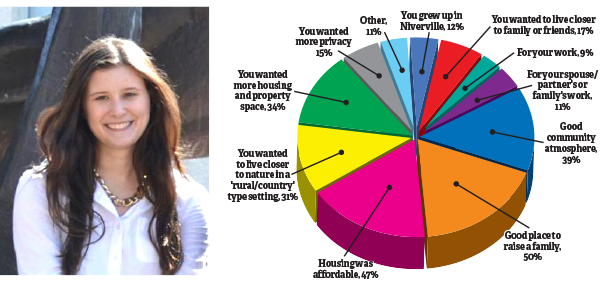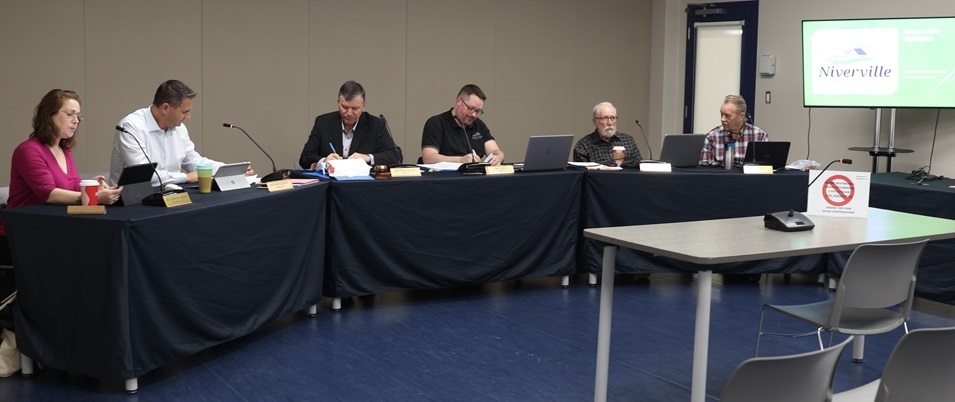
Starting in April, Ellen Enns, a second-year Master of City Planning student at the University of Manitoba, chose to use Niverville as a case study for her thesis. The paper focuses on the relationship between where people choose to live and how they commute to work.
Enns has said that Niverville is a particularly compelling community because of its rapid population growth and the number of its residents who commute. Indeed, part of the reason she chose Niverville is because its residents don’t just travel to work in Winnipeg, but to a balance of nearby communities.
Throughout April, Enns visited the community and conducted surveys, both online and in-person. Although her work on the thesis is ongoing, The Citizen has invited Enns to share her preliminary findings.
To date, the Niverville Commuting Survey has revealed interesting information about commuters. Of the respondents, 47 percent have a household of four or more people, and within those households, 67 percent of them contain two workers over the age of 18 either in full-time, part-time, temporary, or contract work. When asked how many years people lived in Niverville, 36 percent of respondents said one to five years, followed by five to ten years at 26 percent.
The survey listed several reasons for respondents to choose from to describe why they chose to live in Niverville. Respondents were able to choose as many options that applied to them. Of the options presented, the top three reasons for living in Niverville were “a good place to raise a family” at 50 percent, “housing was affordable” at 47 percent, and “good community atmosphere” at 38 percent (see graph). In addition to these reasons, 54 percent of respondents stated that the community equalled the expectations they had before moving there, and 33 percent said it exceeded expectations, showing the high satisfaction amongst residents of the community they chose to live in.
When asked about workplace location, 57 percent of people indicated that they work in Winnipeg, 14 percent work in a town or city other than Winnipeg, and 14 percent work in Niverville. Nine percent of respondents work in a rural area outside of Niverville, and six percent work at home.
Not surprisingly, 84 percent of Niverville residents report travelling to work by car. Seven percent of commuters opt to carpool and five percent have a combination of travel modes; for example, they sometimes walk and sometimes drive to work. Forty percent of respondents have a commute time between 30 and 45 minutes in length, which is not much different from someone living in a suburban area of Winnipeg commuting to work downtown.
As the average commute time for Niverville commuters is similar to Winnipeg commuters and the non-Winnipeg commute locations equate to 43 percent of the responses, the data suggests that Niverville may not be a “commuter town,” as people often refer to it. Non-Winnipeg workplace locations are almost all located in the southeast region of Manitoba, showing that employment is scattered throughout Manitoba, and people living in Niverville do not always have unusually long commute times.
That being said, 50 percent of respondents reported that their commute has increased since moving to Niverville, while 21 percent reported it decreased and 35 percent reported that it stayed the same. When asked if respondents would ever consider moving closer to where they worked, 56 percent said no and 42 percent said yes. This data shows the satisfaction most people in Niverville have with their community, and seems to imply that lengthening their commute is worth the trade-off.
Lastly, when respondents were asked if they enjoy their commute, 56 percent stated “most of the time,” and 20 percent said that they “always” enjoy their commute. Several respondents described their commutes as “their time” and a “time to decompress from the day.” They noted that their home lives are so busy that their commutes give them quiet time to reflect on the day and sometimes enjoy a sunrise or sunset. Many people stated that they enjoy highway driving but dislike city driving.
Finally, the highest recorded negative comment regarding a person’s commute was bad weather and road conditions.




















